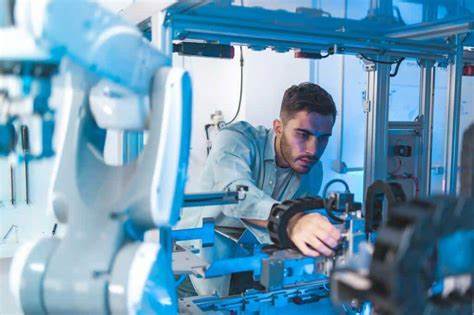
Instrumentation engineering
Instrumentation engineering involves designing, developing, and maintaining instruments used to monitor and control various industrial processes. These instruments ensure accuracy, efficiency, and safety in manufacturing, automation, and research settings. Instrumentation engineers play a crucial role in integrating sensors, control systems, and communication networks to optimize operations.
Instrumentation engineers apply principles of electronics, measurement, and control systems to develop instruments and systems that monitor and regulate processes in industries such as manufacturing, oil and gas, pharmaceuticals, and power generation. They work on a wide range of equipment, from simple sensors to complex control systems, ensuring they function reliably and efficiently.
A career as an instrumentation engineer offers opportunities to work with advanced technology and contribute to industrial automation, efficiency, and safety. The educational path involves a strong foundation in engineering principles, practical experience through internships, and continuous learning to stay updated with technological advancements. With increasing demand across various industries, instrumentation engineers play a vital role in optimizing processes and implementing innovative solutions.
Role Desciption
- System Design: Design and develop instrumentation systems based on project requirements.
- Sensor Selection: Select appropriate sensors and instruments for measuring parameters such as temperature, pressure, flow, and level.
- Control Systems: Develop and implement control systems to automate and optimize processes.
- Installation and Maintenance: Install instruments, calibrate them, and ensure proper functioning through regular maintenance.
- Troubleshooting: Diagnose and resolve issues with instrumentation systems to minimize downtime.
- Safety Compliance: Ensure instruments meet safety standards and regulatory requirements.
- Documentation: Maintain documentation of system designs, specifications, and maintenance records.
- Collaboration: Work with multidisciplinary teams including engineers, technicians, and project managers.
Eligibility
Educational Route to Become an Instrumentation Engineer in India
- 10+2 with Physics, Chemistry, and Mathematics
- B.Tech/B.E. in Instrumentation Engineering or B.Tech/B.E. in Electronics and Instrumentation Engineering
- M.Tech/M.E. in Instrumentation Engineering
Certifications and Professional Development Consider certifications in specific instrumentation technologies or project management to enhance skills.
- Certified Automation Professional (CAP)
- Certified Control Systems Technician (CCST)
- Project Management Professional (PMP)
Pros/Cons
Pros:
- Opportunity to work with advanced technology and systems.
- High demand across industries for instrumentation expertise.
- Potential for career growth and specialization.
- Varied job roles in design, maintenance, and project management.
- Contribution to improving industrial efficiency and safety.
Cons:
- High responsibility for system reliability and safety.
- Exposure to hazardous environments in some industries.
- Continuous learning required to stay updated with technology.
- Challenges in troubleshooting complex systems.
- Pressure to meet project deadlines and operational demands.
Leading Professions
View All
Instrumentation Engineer
Design, develop, and mai...
6.0LPA

Control Systems Engineer
Specialize in designing ...
7.0LPA

Process Engineer
Optimize industrial proc...
6.5LPA

Automation Engineer
Develop automated system...
7.0LPA

Project Engineer
Manage instrumentation p...
6.5LPA

Maintenance Engineer
Ensure the reliability a...
5.5LPA
CAREER VIDEOS
Career Path
10 + 2 with PCM
1 Steps
Skills
Recruitment Area
Pharmaceutical Companies ,
research agencies ,
manufacturing ,
Engineering Consulting Firms ,
Oil and Gas Companies ,
Power Generation Companies .
Recruiters
Cipla ,
Reliance Industries ,
Tata Motors ,
Tata Power ,
Council of Scientific and Industrial Research (CSIR) ,
Indian Institutes of Technology (IITs) ,
Defense Research and Development Organization (DRDO) ,
Oil and Natural Gas Corporation (ONGC) ,
Indian Oil Corporation ,
Emerson Electric ,
Sun Pharma .
Explore Colleges
Exams & Tests
Interested? Take the next step for this career
10 + 2 with PCM
- 1 Steps
Skills Needed
Exams and Tests
Recruitment Area
Pharmaceutical Companies ,
research agencies ,
manufacturing ,
Engineering Consulting Firms ,
Oil and Gas Companies ,
Power Generation Companies .
Recruiters
Cipla ,
Reliance Industries ,
Tata Motors ,
Tata Power ,
Council of Scientific and Industrial Research (CSIR) ,
Indian Institutes of Technology (IITs) ,
Defense Research and Development Organization (DRDO) ,
Oil and Natural Gas Corporation (ONGC) ,
Indian Oil Corporation ,
Emerson Electric ,
Sun Pharma .



















